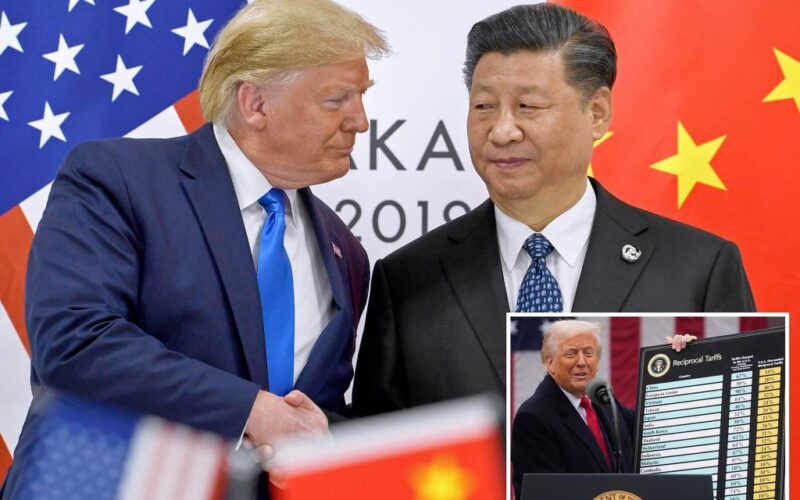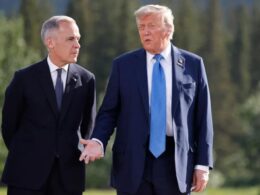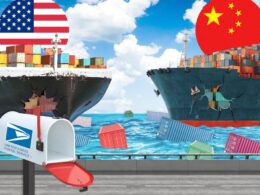President Donald Trump said his threatened high tariffs on Chinese goods are “not sustainable,” even as his administration presses ahead with sweeping trade penalties against Beijing in a deepening tariff standoff.
“It’s not sustainable,” Trump told Fox News’ Maria Bartiromo on “Sunday Morning Futures,” when asked whether the massive levies could remain in place without hitting the US economy.
“But that’s what the number is, it’s probably not, you know, it could stand, but they forced me to do that.”
Trump also sounded a more conciliatory note in his Friday interview with Bartiromo, particularly in light of reports that the president threatened to cancel a planned meeting with his Chinese counterpart, Xi Jinping.
“I get along great with him,” Trump said of Xi. “I think we’re going to be fine with China, but we have to have a fair deal. It’s got to be fair.”
The president’s remarks came as Washington and Beijing face the steepest trade confrontation in years — with US import taxes on Chinese products climbing as high as 145% in a tit-for-tat exchange that has rattled global markets.
Trump’s latest tariff pause — a 90-day truce set to expire Nov. 10 — has kept those duties on hold while both sides attempt to reach new terms.
But with China expanding export controls on rare earth minerals and the US announcing fresh restrictions on Chinese shipping, the path to a deal remains uncertain.
National Economic Council Director Kevin Hassett told Fox Business on Friday that he had “high confidence” Trump and Treasury Secretary Scott Bessent “are going to be able to get together with the Chinese and get this back to a place that’s good for both countries.”
The comments followed Trump’s threat last week to impose a new 100% tariff on all Chinese goods by Nov. 1.
The remarks marked a notable shift from earlier in the week, when Trump signaled on Truth Social that tensions could escalate.
The markets plunged last week after Trump threatened to impose new levies on China. Reaction from Wall Street apparently prompted the president to put out a more conciliatory message to calm jittery investors.
“[D]on’t worry about China, it will all be fine! Highly respected President Xi just had a bad moment,” he wrote, walking back his earlier threats of a 100% tariff.
But Trump renewed criticism of Chinese trade practices, particularly in agriculture.
“We are considering terminating business with China having to do with cooking oil, and other elements of trade, as retribution,” he posted last week.
According to an analysis by law firm Baker Botts published Thursday, the US Trade Representative has already imposed a 100% duty on Chinese-made ship-to-shore cranes and other cargo-handling equipment, while threatening to extend similar penalties to more sectors.
The new tariffs, announced in the Federal Register, take effect Nov. 9 and will cover equipment manufactured by Chinese-owned or -controlled companies anywhere in the world.
That action was just one in a cascade of measures under Trump’s “America First” trade policy this year.
The administration has slapped 50% tariffs on imported steel and aluminum, 25% on automobiles and parts and new reciprocal duties on goods from Canada, Mexico and the European Union.
A separate Section 232 investigation could soon target robotics, medical equipment and semiconductors.
China has retaliated with its own measures, sanctioning US shipping subsidiaries and threatening tighter export rules on critical minerals used in American manufacturing and defense.
The president’s declaration that the tariff regime may be unsustainable could reflect rising pressure from businesses facing higher import costs and supply chain disruptions.
Economists have warned that extending the levies into next year risks raising prices on consumer goods while straining relations with major trading partners.
Despite the mounting fallout, Trump has continued to use the tariffs as leverage in broader negotiations over technology transfers and market access.
The president has argued that his strategy is forcing China to “come to the table” on issues ranging from intellectual property to manufacturing subsidies.
Yet the new duties are already weighing on port operations and agriculture exports. Soybean shipments to China have declined sharply since September, while several US shipping companies have reported delays tied to customs inspections and new port fees.
The administration’s trade team insists the pressure campaign will yield better long-term terms.
The Post has sought comment from the White House and the Chinese government.








